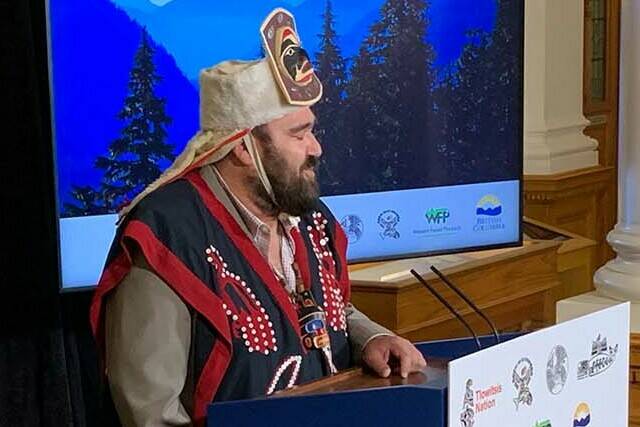Premier David Eby hailed a partnership between four First Nations on Vancouver Island and one of the largest forest companies in British Columbia as a “landmark” agreement that will send signals across the province.
“First Nations around the province are going to look to you,” Eby said during a ceremony at the legislature.
The Tlowitsis, We Wai Kai, Wei Wai Kum and K’ómoks First Nations, all members of the Nanwakolas Council, are acquiring a 34 per cent interest from Western Forest Product in a newly formed limited partnership for $35.9 million.
Nanwakolas Council members belong to the Kwakwaka’wakw group of Nations, located on northern Vancouver Island and the neighbouring southern Central Coast region. The deal is an Incremental Treaty Agreement, a legally binding pre-treaty agreements.
The partnership covers approximately 157,000 hectares of forest land in the territories of the Nations near the communities of Campbell River and Sayward on eastern Vancouver Island. The partnership will manage an allowable annual cut of 904,540 cubic metres of timber and includes a long-term fibre agreement to support Western’s coastal manufacturing operations.
Eby said the agreement speaks to First Nations around the province who want to buy or lease timber supply, while preserving environmental values.
He added that it also speaks to community members-at-large across the province, who earn their living in the resource sector. “Agreements like this bring certainty, bring prosperity to community, that everyone benefits from,” Eby said. “It’s not a zero-sum game.”
RELATED: Landmark deal sees B.C. forest firms treat big cedars like a First Nation would
Nanwakolas Council President Dallas Smith said the agreement reconciles economic consideration with environmental sustainability.
“For our communities, we have watched millions and millions of dollars, billions if you will, of resource come out of territories and getting control of them has never been about the commodification of it,” he said. “It’s never only been about the dollars. Economic reconciliation is vital to our path going forward, but it can’t be at the cost of environmental sustainability.”
Steven Hofer, president and chief executive officer of Western Forest Products, said this partnership “sets forth a new model of forestry” for British Columbia. “We recognize that our future lies not only in the products that we make, but in the relationships that we build,” he said. “Reconciliation is the key to this work.”
By working with First Nations, WFP is working toward a new stewardship model, Hofer added. “We have a long history of working together with the Nations that are represented here today. Going forward, we will jointly manage our mid-Island forest operations, setting the foundation for a stronger future together.”
Hofer added that companies like his have no other option than to engage with First Nations for the sake of Reconciliation and certainty around access.
“I encourage all the other CEOs to have the same type of conversations,” Hofer said. He acknowledged that they do take a lot of work and require appropriate resources. “This is the second formal limited partnerships that we have…and we expect to have more,” he said.
@wolfgangdepner
wolfgang.depner@blackpress.ca
Like us on Facebook and follow us on Twitter.

